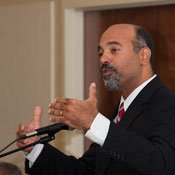As Jackson State University President Ronald Mason Jr. shook hands at a forum last Friday at Koinonia Coffee House in Jackson, he sought to quell concerns about a possible HBCU merger idea he floated to legislators last month. He maintained that his proposal was merely "an idea that was leaked."
"There was no bill or a proposal made to any board; it was a discussion of just one possible answer," Mason told the Jackson Free Press. "There are serious challenges, and I'm just the worker, not the decision maker. My job is to give my best analysis and my best advice."
Last month Mason approached legislators with the idea to downsize historically black colleges Alcorn University, Mississippi Valley State University and Jackson State University into a specialized campus named Jacobs State University.
Mason maintains that his multi-page proposal and PowerPoint slide show, first reported by the Jackson Free Press, were a private idea and not ready for public input.
Sen. David Jordan, D-Greenwood, spoke out against Mason's proposal at a recent rally to support HBCUs at the state Capitol comparing him to a "philistine."
Friday morning, Jordan said that he still opposes Mason's plan and has declined a request from Mason to meet this week to discuss the matter. "I disagree with his proposal, and I know where he stands," Jordan said. "I have nothing more to say to him on the matter."
At Koinonia's Friday forum, Mason tried to distinguish his idea from Gov. Haley Barbour's proposal to merge the same three black universities to save $35 million. Mason said the idea behind Jacobs State was to maintain the three universities while moving programs and resources to save cost, while operating a single-name university.
Mason said the traditions and history of each campus would remain intact unlike the changes in Barbour's proposal.
Michael Robinson, a JSU alumnus, said Mason's idea is to preserve HBCUs while dealing with financial challenges. "(Mason) wants to make agencies stronger. In these tough economic times, he believes it's better to stand as one unified entity as opposed to three," Robinson said. "The problem is we are caught up in traditions and resisting change."
Mason said he has no plans to hold community meetings on the issue, but will accept invitations to speak publicly about it.
Other state universities are looking at options and tactics to determine cost-saving and consolidation efforts.
In response to a request of Mississippi Institutions of Higher Learning Commissioner Hank Bounds and board members for more efficient ways to cut costs, Mississippi State University released a report last week defining 60 cost-cutting strategies. The university is expecting a 23 percent reduction in state funds by 2012.
The report is a result of three months of work by the President's Select Committee on Efficiencies and Innovations. Convened by MSU President Mark Keenum, the 33-member committee was composed of faculty, staff, administrators and student representatives. The report highlights programs that can be merged such as the university's accounting and finance departments. The report also proposes doing away with degree programs with low enrollment, such as agriculture pest management.
MSU and Mississippi University for Women are also working on efforts to consolidate services. Mississippi University for Women President Dr. Claudia Limbert says she recently started discussions with Keenum, and appointed staff to evaluate services that can be combined.
"We don't know yet what services will be combined," Limbert said. "The economy is a mess right now, and it looks like it will get a lot worse. The guiding principal is that if it doesn't save money or help services, we aren't going to do that efficiency. We are going to look hard and see if it benefits the universities."



Comments
Use the comment form below to begin a discussion about this content.
comments powered by Disqus